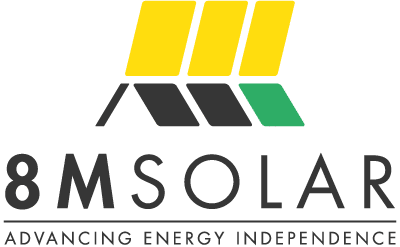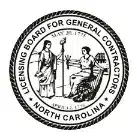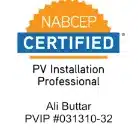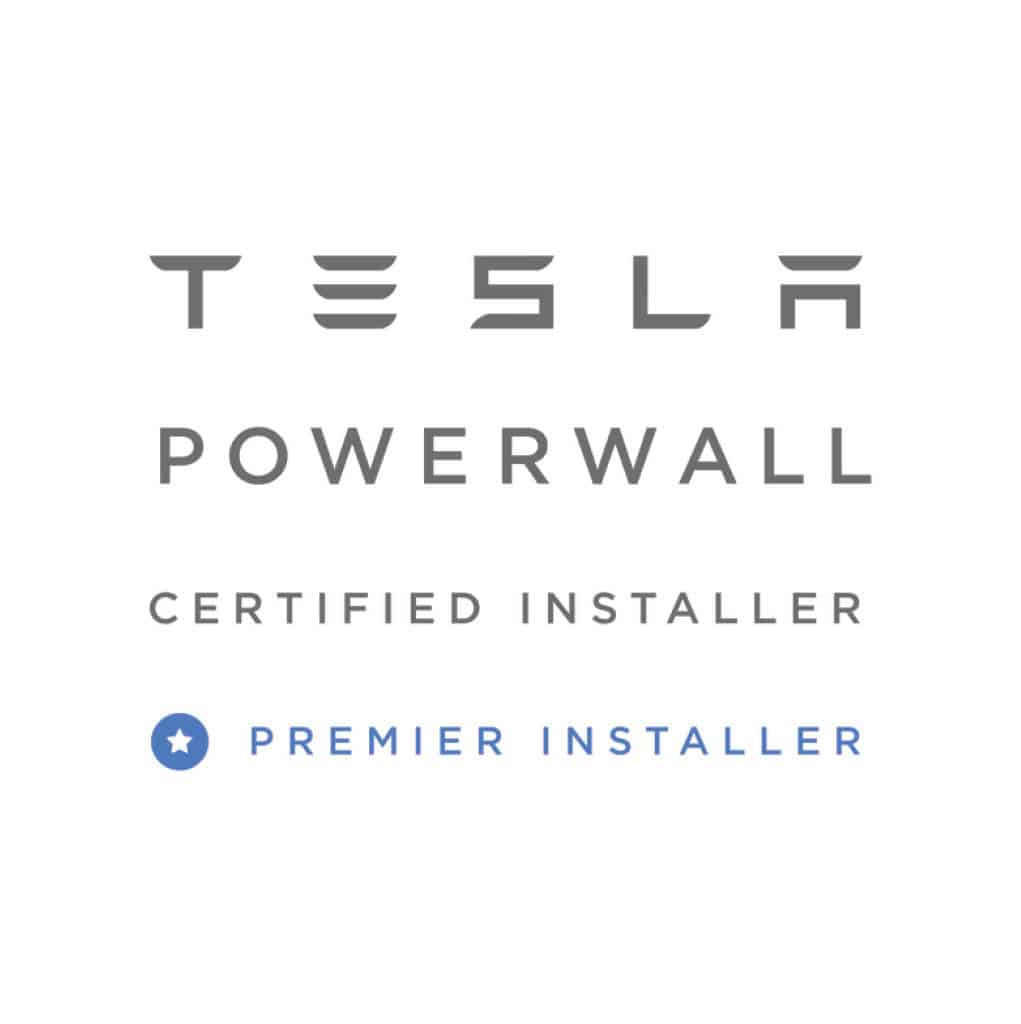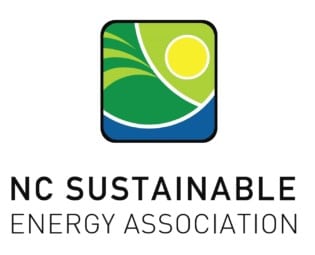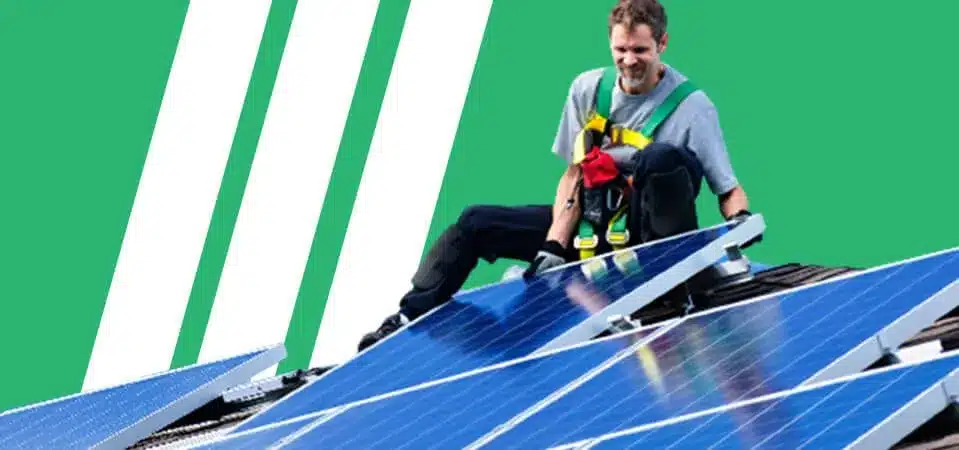
Solar energy is a booming market, with an average annual growth rate of 33%. Many people are switching to solar to help the environment and move away from fossil fuels while saving on their monthly utility bills. Solar energy is abundant, and it’s no wonder people want to make the switch.
But what’s the cost of installing solar panels for the average homeowner or business? Below, we’ll guide you through the average cost of solar panels and the many incentives you can take advantage of to help you determine whether solar is a worthwhile investment for your home or business.
Table of Contents
- How Much Do Solar Panels Cost?
- Use Satellites to See What Solar Panels Cost In Your Area
- Why Do Similar Sized Solar Panel Systems Differ in Cost?
- How does Roof Type Change the Cost of Solar Panels?
- How to Choose Between Power Optimizers and Micro-inverters
- What are Other Solar Panel Cost Considerations?
- Are Solar Panels Worth the Investment?
- Which Solar Panel System is Best for My Project?
- Typical Installation Cost
- How Much Does Solar Installation Cost in North Carolina?
- Invest in Clean Energy with 8MSolar
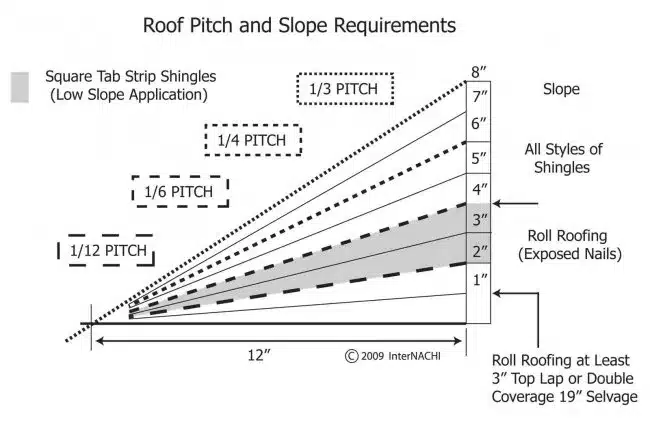
How Much Do Solar Panels Cost?
How much do solar panels cost on their own? How much does it cost to install solar panels? Several factors determine solar panel cost with installation. Solar panel cost itself varies from region to region and from project to project. Different manufacturers have different types of panels, using various technologies with different efficiencies, all of which affect pricing.
The average cost of solar panel installation also varies for several reasons. Is it a residential solar panel installation or a commercial installation? If you talk to multiple installers like you should, there will be multiple price points for a full system installation. There are good reasons for this, however. Different installers have different preferences on all the items underneath the panels that customers never see. These racking, mounting and electrical wiring choices affect system performance and solar panel cost.
Solar tax credits also vary and can affect system pricing a lot. Furthermore, residential & commercial projects have a wide range of electricity bills that customers are trying to offset, so it is always recommended to look at these projects on a case-by-case basis.
In our opinion, it’s important not to cut corners on your solar installation by opting for lower-quality mounting solutions. When asking, “How much do solar panels cost?” it’s easy to focus only on price, but that shouldn’t be the only factor guiding your decision. We always recommend that customers take a deep dive into the technical aspects of their purchase and fully understand the components they’re being offered—not just the solar panels and inverters, but also the mounting systems, racking, and rails.
A solid, durable mounting system is crucial for the long-term reliability and performance of your solar energy setup. Cheap mounting solutions may save money upfront, but they can lead to costly repairs, system failures, and reduced lifespan for your solar panels. The quality of your system ensures that your panels remain securely in place, even during difficult weather conditions, providing peace of mind and maximizing the efficiency of your system.
At 8MSolar, we prioritize quality in all components of the solar energy system, because we believe in delivering a product that offers value over time—performance, durability, and reliability are key to getting the most out of your investment. So, when evaluating a solar installation, remember that looking beyond the initial cost to the overall system quality will provide you with greater long-term satisfaction and return on investment.
Use Satellites to See What Solar Panels Cost In Your Area
[solar_wizard layout=”medium”]Why Do Similar Sized Solar Panel Systems Differ in Cost?
There are many reasons why two similarly sized systems could end up costing differently. Some of the things that may affect Solar PV system costs are:
- Roof pitch: Generally speaking, the steeper the roof, the more careful people will have to work. Roofs with a steep pitch often proceed slowly and cautiously, adding time to the project. This can increase labor costs for solar panel installation and affect the total installation cost.
- Roof material: Mounting mechanisms differ based on the construction of the roof type. For example, the IronRidge mounting mechanism we typically use on shingled roofs will not work on metallic roofs. Vice versa, S5 clamping used for metal roofs does not work on shingles. These differences can change the pricing of a system depending on how difficult it might be to install and match your particular system to your roof material.
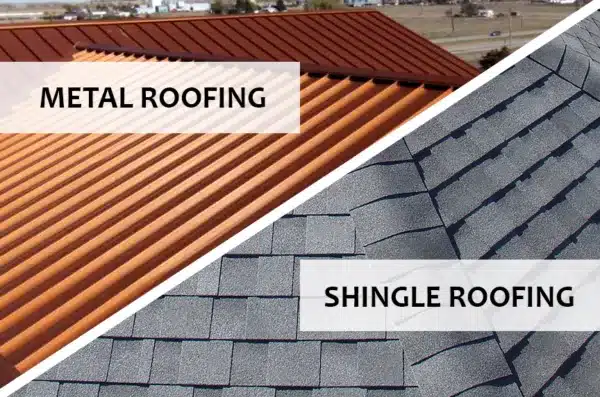
How does Roof Type Change the Cost of Solar Panels?
Your roof type matters when pricing out the total roof-mounted solar panels cost. Shingle vs. Metal vs. flat EPDM can affect solar mounting hardware and thus prices.
- Size of system: Typically, the larger the system, the larger the inventory cost and the longer it takes to install it. Both mechanical and electrical crews will spend more time on site on a larger system than a smaller one, and therefore the labor costs go up in addition to increased hardware costs. A larger system typically means a higher solar power system cost but potentially lower cost per watt!
- Length of electrical runs: If a Solar PV system is installed next to the incoming mains, the length of conduit runs will be small and will take less time. If a roof is utilized far away from incoming mains, the cable and conduit runs will be a lot longer and take longer to install. This increases labor and material costs and adds to the total solar panel cost. The same goes for trenching. If a ground-mounted solar system is installed, trenching can add significant time, labor and expense to a project, thereby increasing the solar panel installation cost.
- Solar PV Technology: There can be a marked difference in system costs when using a completely different technology. For example, using a SolarEdge power-optimizer-based system vs. an Enphase micro-inverter-based system may affect pricing. Different Solar PV architectures have different component requirements and different installation guidelines, which can affect the pricing of components and labor required to install. Installation cost can therefore change if a different technology is desired.
How to Choose Between Power Optimizers and Micro-inverters
Different types of solar technologies come with varying levels of production reliability and maintenance concerns. The age-old debate between power optimizers and microinverters is one that often sparks strong opinions, and it’s important to weigh the pros and cons of each to determine the best fit for your solar panel system.
Both power optimizers and microinverters are types of converters that attach to individual solar panels and help maximize their performance. They play an important role in optimizing energy production, particularly in situations where panels are exposed to shading during the day, such as on roofs with obstructions like trees or neighboring buildings.
Understanding the differences—like price, warranty, and maintenance needs—can help guide you toward the right choice for your solar panel project. Power optimizers work by conditioning the DC power coming from each panel before sending it to a central inverter, ensuring that each panel operates at its peak performance. They tend to be more cost-effective than microinverters but still offer benefits like individual panel monitoring and performance optimization.
Microinverters, on the other hand, are installed on each panel, converting DC power to AC power right at the panel. This approach offers the advantage of a more decentralized system, meaning that if one panel experiences a performance dip due to shading, the others won’t be affected. Microinverters typically come with longer warranties than power optimizers, but they tend to be more expensive upfront. Maintenance and replacement can also be a consideration since each unit is installed on each panel, which may require more effort to diagnose and replace if something goes wrong.
The choice between power optimizers and microinverters depends on your specific needs, budget, and the conditions of your roof. If you have partial shading or a complex roof layout, these technologies can significantly improve the efficiency of your system. At 8MSolar, we help you navigate these options and provide you with a solution that ensures long-term reliability and maximized energy production.
A hardware-agnostic solar panel installer such as 8MSolar can give you the exact pros and cons for each and guide you on which option makes sense for your home.
Contact us today to have one of our unbiased, hardware agnostic sales consultants guide you on the best solution for your home or business.

What are Other Solar Panel Cost Considerations?
There are a few other considerations when determining the cost of your solar system:
- Financial Incentives available: Different areas and regions have different incentives available. Different utility companies have different incentives that they offer. For example, Duke Energy has a rebate available right now. Local municipal generating facilities such as the Town of Apex do not. All of this can affect your total solar panel cost.
- Rooftop vs. ground mount vs. stand-alone structure mount: Where the Solar PV array is installed can dramatically influence solar panel cost. Each option comes with its pros and cons. Rooftop installations must follow different design and installation considerations from stand-alone structures, which have different considerations than ground mount systems. Depending on your preference, ground solar panels carry different costs and can affect the prices of solar panels.
Are Solar Panels Worth the Investment?
In the last decade, the price of solar panels has fallen by approximately 60%. They can help you save on your monthly utility costs, and you can even sell any excess energy your solar panels produce back to utility companies using net metering.
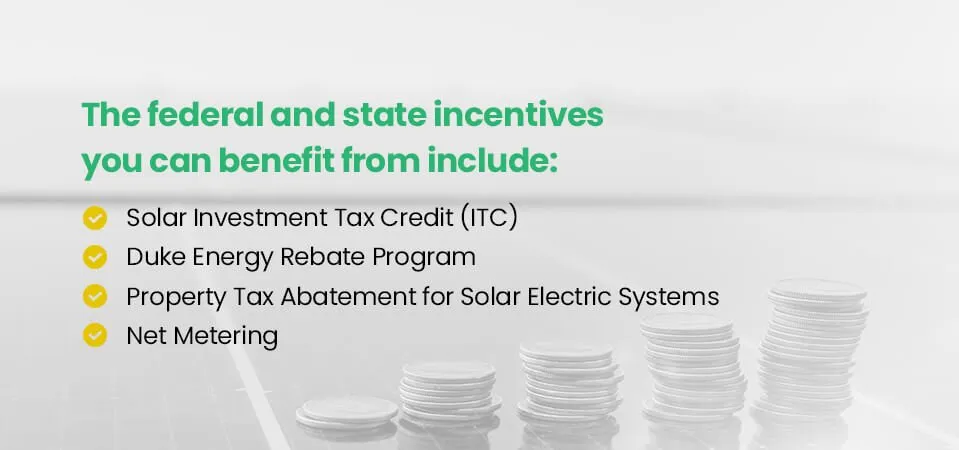
Solar incentives in North Carolina also make it a worthwhile investment as the state tries to encourage more homeowners and businesses to turn to clean energy. The federal and state incentives you can benefit from include:
- Solar Investment Tax Credit (ITC): The ITC will provide a 30% tax credit to residential and commercial solar installations through 2032, helping you save on what you owe the federal government for your new solar system. In 2033, the ITC drops to 26% and in 2034, it drops to 22%.
- Property Tax Abatement for Solar Electric Systems: This tax abatement exempts 80% of the value of your solar system from your property tax. Homeowners with residential systems can also potentially see a 100% percent abatement, reducing the amount they pay yearly in property taxes. These tax savings help homeowners and businesses who want to invest in solar save on many of the associated costs.
- Net Metering: North Carolina has a net metering policy that requires investor-owned utilities to credit you for the excess energy your solar systems produce, and you’ll receive full retail value for the extra solar energy.
You can also see if your utility company, city or county offers any additional incentives. For example, the Fayetteville Public Works Commission (PWC) Community Solar program offers monthly credits based on the number of installed panels on a residential or commercial property. With these various incentives, solar panels as a worthwhile investment for businesses and homeowners alike.
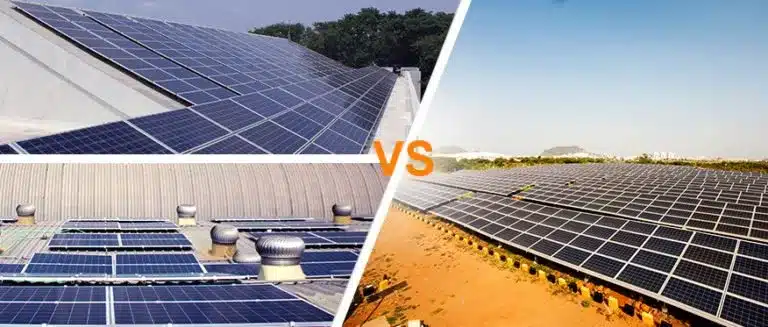
Which Solar Panel System is Best for My Project?
Different solar panels have different performance ratings. Not all panels are suitable for all applications. Contact one of our sales consultants for an unbiased opinion on what solar panels will work best for your project. The following sections will give you a brief overview of the various options you have when choosing solar panels.
- Household electrical demand: This ties back to system size. The more you prefer to offset your electrical usage, the larger the Solar PV system needs to be and the more the costs will be for both labor and material.
- Choice of solar panels: Different solar panels come in different efficiencies and sizes. Typically the higher the production per unit area, the higher the solar panels cost. This can affect the pricing of the system. In certain situations, if you have minimal roof space, you might want panels with the highest specific output. This system might have a different solar panel cost than a system that utilizes slightly lower efficiency modules because roof space is not at a premium. Recently, solar panel tariffs have bumped up pricing for all solar panels. In addition, different solar panels are produced in different areas of the world and carry different warranties. All of these factors can affect solar panel prices.
- Off-grid vs. battery backup system vs. grid-tied systems: We consider your needs and your unique energy profile to determine if your system design should be entirely off the grid, grid-connected with a backup battery or just grid-connected. Every system has special needs, such as different components and varying code requirements, all of which affect the overall price. Even systems of the same size can have a wide variance in their pricing due to their system type. For example, a system that’s 10kW and grid-connected would cost less than a system the same size with a battery backup system. Adding the battery and additional labor and expertise required can significantly increase costs.
- Permitting, inspections & interconnections: Based on the area where you live, and the utility that serves you, the costs associated with permitting, inspections and interconnections can vary widely. Different cities have different requirements for permitting. Similar different utilities have different rates for interconnection applications. All of this brings variability into pricing.
Typical Installation Cost
| System Size in kW | Est. Price Before 30% FTC | Est. Price After 30% FTC |
| 4 kW | $12,432.00 | $8,702.40 |
| 5 kW | $14,280.00 | $9,996.00 |
| 6 kW | $16,380.00 | $11,466.00 |
| 7 kW | $17,836.00 | $12,485.20 |
| 8 kW | $19,936.00 | $13,955.20 |
| 9 kW | $22,302.00 | $15,611.40 |
| 10 kW | $24,500.00 | $17,150.00 |
| 11 kW | $26,180.00 | $18,326.00 |
| 12 kW | $27,720.00 | $19,404.00 |
| 13 kW | $29,484.00 | $20,638.80 |
| 14 kW | $31,55.00 | $22,089.20 |
The average cost of solar panel installation for some common residential solar panel system sizes is listed above. This is just an average cost for typical system size. Please contact us today so we can look at your energy usage and provide a customized quote for your solar panel installation cost. Check out our FAQ page for answers to questions about 8MSolar and our services.
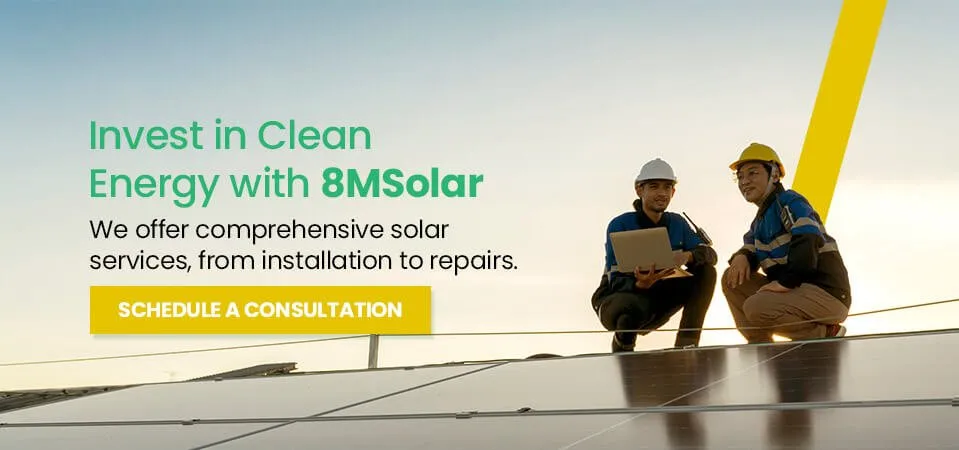
How Much Does Solar Installation Cost in North Carolina?
The average home solar panel system price will vary depending on the size of the system (number of panels); and the equipment used. We have various options and install all makes and models of equipment, so we will work with you to design a system that covers your needs while staying within your budget.
Roughly, average system prices range from $14,000 – $30,000+ before any incentives are taken into account. The Federal Tax Credit for solar is currently set at 30%. This credit is available to anyone who pays Federal taxes and can be stretched out up to five years if necessary.
If your entire solar project costs $18,000; you would receive $5,400 back via this tax credit when you file your taxes for the year in which the system was installed. You do not have to owe taxes in order to claim this credit – your consultant can review this with you in greater detail and go over any specific questions!
Invest in Clean Energy with 8MSolar
Solar energy can help you reduce your overall carbon footprint and reduce your carbon footprint. Investing in solar doesn’t have to be an expensive venture either when you take advantage of the many solar incentives offered by the federal and state governments. 8MSolar is here to help you find a new solar system that fits your budget.
We offer comprehensive solar services, from installation to repairs. We try to make switching to solar as easy and seamless as possible, using our expertise and knowledge to pair you with a solar system that fits your needs, regardless if you’re installing a system on a residential or commercial property. Schedule a virtual consultation today to learn more!
